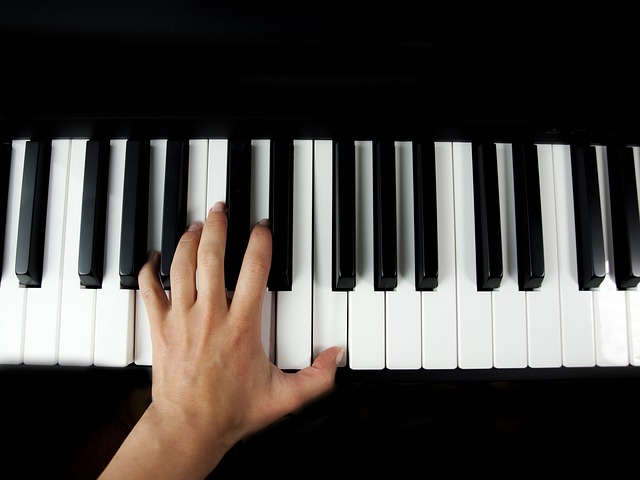
In our last article, (Transitional Chords Part 1) I covered transitional chords using a gospel progression to showcase how effective they can be. This article is going to be very similar but I want to change things up by showcasing some altered chords.
If you're familiar with altered chords, you'll know that the simplest type of altered chord is a Major triad with a flatted 5th. In order to create a flat 5 triad, you only need to understand the Major triad.
You have the Major triad. It consists of the root, third and fifth. Here's C Major for our example. To create the Major triad with a flatted 5th, just lower the 5th a half step. You now have C flat 5 triad.
To create the Major triad with a flatted 5th, just lower the 5th a half step. You now have C flat 5 triad. Just as you can create the Major triad with a flatted 5th, you can sharpen the 5th also. Just take the Major triad, and raise the 5th a half step.
Just as you can create the Major triad with a flatted 5th, you can sharpen the 5th also. Just take the Major triad, and raise the 5th a half step. These two altered triads are among the simplest altered chords. Just like diminished triads, they don't stand on their own but are used as passing chords. They can make all the difference in a chord progression because they stand out by contrasting Major and minor chords and add flavor to them.
These two altered triads are among the simplest altered chords. Just like diminished triads, they don't stand on their own but are used as passing chords. They can make all the difference in a chord progression because they stand out by contrasting Major and minor chords and add flavor to them.
To really make an altered chord shine, the dominant 7th is often added. These are altered dominant chords. They're very common chords used in jazz music as well as other genres of music that utilize jazz elements in them.
To alter a dominant chord, just apply the same principals as you would to Major triads.
There's also another tone which is often added to the previously mentioned chords. It's also altered in the same way. What I'm talking about is the 9th. If you're familiar with higher extensions, you know that the 9th is located a whole step above the root of the chord.
Take the 9th and raise it a half step and you have the C7 sharp 9 chord.

Lower the 9th a half step and you have the C7 flat 9 chord.
You can combine the altered 9th and 5th tones to create altered chords also.

Keep in mind that the voicing of the chord make all the difference of how it sounds. When all of the tones in the chord are in sequential order, this is known as a closed voicing.
Even though it's easy to define a chord in closed voicing, chords can sound better when you play them in an open voicing.
You're not prohibited from playing chords with closed voicings, and sometimes they fit in with the rest of your chords, but it creates interesting harmonies to open your chords up most of the time.
Now that we have a good grasp of altered chords, let's use our gospel progression to showcase altered chords.
Our gospel chord progression will be slightly different from part 1 of this series and will consist of the following:
Key of E flat 1-6-2-5-1 Progression
Now let's add in some altered 7th chords. Moving from our 1 chord, we won't go directly to the 6 chord. Let's add some flavor by adding a couple of triads over the 1 chord.
We'll start out on the 1 chord (E flat Major).

After the 1 chord, we'll play a chord on the minor 3rd tone as a Major chord over the 1 chord.
Before moving to our 6 chord we'll play a chord on the flat 7th tone as a Major chord also over the 1 chord.
Now let's play our 6 chord as an altered chord. We'll alter the 9th and 5th tones by sharping them.
Let's create another detour by moving to the flat 2 chord and altering it also. This altered chord could be defined as a cluster chord due to the tones being so close together. From there, we'll go to the 2 chord and play it as a minor chord.
From there, we'll go to the 2 chord and play it as a minor chord. We could go directly to the 5 chord, but let's take another altered chord detour. The flat 5 chord is a half step below the 5 chord. So we'll play an altered chord on the flat 5.
We could go directly to the 5 chord, but let's take another altered chord detour. The flat 5 chord is a half step below the 5 chord. So we'll play an altered chord on the flat 5. Arriving at the 5 chord we can play a chord with suspended quality to it. This will lead us back to the 1 chord.
Arriving at the 5 chord we can play a chord with suspended quality to it. This will lead us back to the 1 chord.
 You've probably noticed that some of the same chords in our diminished 7th chords article are present in this article about altered chords. That's the great thing about having the knowledge and skills to get creative with chords. There are infinite ways to voice and substitute chords to keep the songs you're playing fresh and interesting. Just as with the diminished chords we used in our gospel progression, we're only scratching the surface with these altered chords. There's a lot more fun to learn about them.
You've probably noticed that some of the same chords in our diminished 7th chords article are present in this article about altered chords. That's the great thing about having the knowledge and skills to get creative with chords. There are infinite ways to voice and substitute chords to keep the songs you're playing fresh and interesting. Just as with the diminished chords we used in our gospel progression, we're only scratching the surface with these altered chords. There's a lot more fun to learn about them.
Until next time, Go Play!
Greg Lee
Latest posts by Greg Lee (see all)
- What is a minor/Major 7 Chord? - October 26, 2023
- 7 Chord Substitutions that Professionals Use - October 19, 2023
- 5 Simple Chord Tricks to Sound Amazing - October 5, 2023



